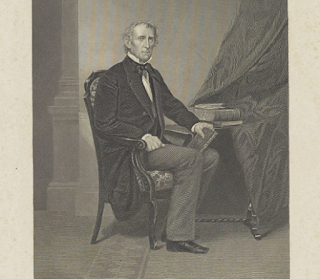It’s guest blog time! Today we’re welcoming one of my dear friends and fellow shenaniganizers (and history nerd!) Katie Kennedy, who courageously agreed to share some of her current historical research with us, even though flaming bags of doggie doo were involved. She is the author of The Constitution Decoded (Workman) and a forthcoming collective biography of the presidents, The Presidents Decoded (Workman, January 2023), both for MG/YA readers. She has also written two young adult novels, Learning to Swear in America and What Goes Up.
* * *
When he was in Congress, Tyler opposed the Missouri Compromise (1820), which outlawed slavery above Missouri’s southern border. Tyler objected because he thought slavery should be allowed everywhere. A decade later, South Carolina tried to secede; Tyler was the only U.S. Senator to oppose the Force Bill, which gave President Andrew Jackson the power to enforce a federal law if a state refused to recognize it. Jackson was desperately trying to hold the country together and he managed to do it—but he sure didn’t get any help from John Tyler.
Tyler was William Henry Harrison’s running mate in the 1840 presidential election. Harrison died a month after taking office and Tyler became the third president in five weeks. (The first was Martin Van Buren, who served before Harrison.)
Tyler was a strict constructionist who thought the Constitution granted no power it didn’t explicitly list—that is, until Harrison died, at which point he declared himself to be the actual, not acting, president, although the Constitution didn’t say that the vice president became president if the executive died in office. (The Twenty-Fifth Amendment clarified the point—in 1967.) Most members of Congress thought he wasn’t a real president, but he returned letters addressed to “Acting President” unopened and his wife had the band play “Hail to the Chief” when he arrived at official functions, starting that tradition.
Tyler was a Whig but he vetoed Whig bills. He belonged to the party not because he agreed with its platform, but because he disliked Andrew Jackson’s Democratic party. His entire cabinet resigned (except for Secretary of State Daniel Webster, who was negotiating an important treaty). People referred to Tyler as “His Accidency” and Whigs kicked him out of the party—while he was the sitting president. It was Tyler who refused to return the Amistad defendants to Africa after their victory in the Supreme Court, making it necessary to raise private funds. Tyler was also the first president to have articles of impeachment drawn up against him—which were filed by a representative from his home state of Virginia. Congress did not go forward with the impeachment, however.
Tyler did find someone who liked him. Two years after his first wife, Letitia, became the first First Lady to die in the White House, he married Julia Gardiner. Tyler had fifteen children, the most of any president.
When the Civil War began Tyler voted for Virginia’s secession and was elected to the Confederate Congress, making him the only president who clearly committed treason after leaving office. He died in 1862, before the war ended, and was never tried.
How bad was Tyler? When the Brooklyn Daily Eagle reported his death it wrote, “His beautiful residence has been occupied by Union soldiers, his magnificent State has been ravaged by war, and the country so prosperous when he administered its affairs, is rent with civil war. John Tyler did perhaps as little as any man to prevent these evils.” Ouch.
* * *
Thanks, Katie! Some day we'll have you back to discuss your favorite presidents to go fishing in Alaska and to go out for ice cream with. 😉
You can find Katie’s The Constitution Decoded (and her other books as well) at Barnes and Noble, Amazon, Kobo, or at your local independent bookseller.







No comments:
Post a Comment